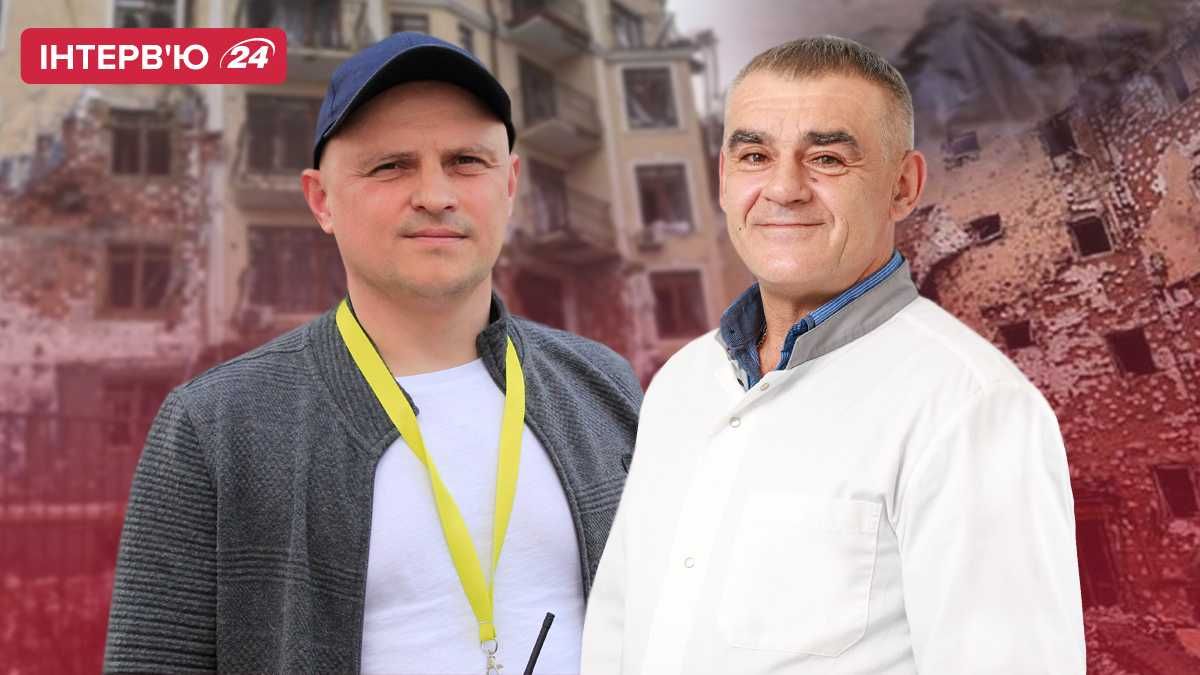Andriy Levkisky, the chief doctor and director of the Irpin Primary Health Care Center, told Channel 24 about those terrible days. He stayed in Irpin with a small group of doctors and volunteers who rescued people under constant fire from Russian invaders. Also, the head of the 7th outpatient clinic of family medicine Serhiy Horoshko.
Read here "My son has already been in hell": what parents of the Azovstal defenders say
"Given the fact that 90% of the staff are women, I have issued an order that people don’t have to show up at the outpatient service, don’t have to work, but instead must take care of their families. And whoever has the opportunity must leave the city and evacuate.”
He said that the doctors decided that if possible they would provide medical care in the city to the very last moment. After all, at that time there were still many people in Irpin, many did not understand that it was necessary to evacuate, that active fighting proceeds. Therefore, there was a need for doctors. Bucha and Vorzel were cut off, and some women had to give birth. Therefore, it was decided to stay.
Levkivsky showed red crosses at the clinic. They were painted to indicate that it was a security facility. When the territory of the medical facility started to "get hit", the doctors hoped that these signs would prevent active hostilities. However, the occupiers fired the building, and you can still see funnels and fragments around it.
An emergency medical staff was established on the basis of the polyclinic. At first, they helped ordinary civilians - family doctors consulted and dispensed medicines, because all pharmacies in the city were closed. Several doctors from the "secondary school" also joined - a traumatologist and a surgeon, who also consulted. However, with each passing day the situation was getting worse - the occupiers captured Bucha and began massive shelling of Irpin.
"The wounded and military and civilians began to arrive. As you can see, this clinic is an outpatient service and it was not intended for medical care of wounded patients. The Irpin Central City Hospital in Bucha and the maternity hospital in Vorzel were cut off from us. It was physically impossible to get there.”
Among the remaining doctors was a doctor who had worked as an obstetrician-gynecologist for a long time. Levkivsky himself is an anesthesiologist. People who don’t work in the clinic, but who live in the city of Irpin, also came to help. Thus, a team was created, which even "gave birth in this institution, where no one had ever given birth."
"We were driving around the city and getting people from the line of fire, out of damaged buildings"
The chief doctor said that it was being pulled off under fire, without light and water supply. At first the military were arriving. They were in ammunition and more protected. They suffered less, instead civilians were arriving in critical condition.
"We made a deal with our military hospital on the other side of Irpin. Here we had a stabilization point. We drove and picked up people from the line of fire, out of damaged buildings. Here they were stabilized and received emergency medical care. The seriously wounded were then transported to a hospital, where they were provided with full surgical and trauma care. ”
Under the polyclinic there is a basement, which doctors have equipped, where they were living and working around the clock since February 25. Patients were received only on the ground floor between the walls, because it was safer that way. But doctors themselves lived in the basement and were on duty. They even took down the mattresses from the day hospital, where they slept.
"We thought that the basement would be safe, but after the territory started to get hit, we realized that it was dangerous to stay even in the basement. Given the fact that the light and heat were gone, and it was still quite cool then, it was, of course, very difficult."
During this period, the medical facility received about a hundred people. On March 5, there were several serious shellings of the territory of the clinic. All the windows were blown out, the power supply was damaged, the boiler house stopped working, and the generator, which was on the territory, did not start. Therefore, it was decided to evacuate all the wounded, which were still alive. Those who died were given to relatives.
"We don't have our own morgue, so we had to improvise, to create an improvised morgue, to assemble bodies. But there was no opportunity to bury them back then. The funeral service did not work at that time."
The first two hundredth was a three-year-old girl. She and her family were made it through the Zhytomyr highway, where they got caught under crossfire. The child was in his aunt's arms. And the bullets went through the stasis of the aunt and child. The woman was rescued, but the child unfortunately died.
Andriy Levkiskyi said that there was a mass grave on the territory of the facility. There were buried two people who had only recently been exhumed. While leaving Bucha, a pregnant woman and her husband got caught under fire near the "Giraffe" checkpoint in Irpin. The man unfortunately died instantly.
We picked up the woman, stabilized her. She had shrapnel wounds to her spine and head. On the second day we transferred her to a military hospital. Unfortunately, she lost her child, underwent many surgeries and is currently undergoing rehabilitation at the 18th hospital. A man was recently exhumed from the hospital territory. He was buried here with another civilian who died at his home, that "got hit". We picked him up, he had a severe skull injury."


